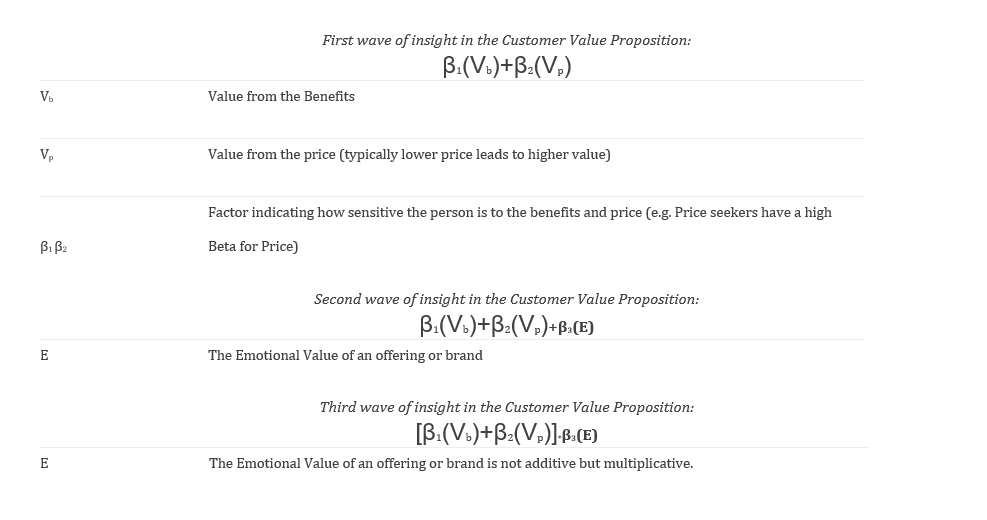For those who can deal with a more mathematical/visual representation, Professor Baba Shiv at Stanford University, taught me the following model:

What does this mean in a more natural language?
For human beings to be able to make a confident decision, an emotional preference needs to exist. This emotional preference is made in the ‘Ventromedial Prefrontal Cortex’ (or the ‘liking system) of your brain and is made unconsciously. People whose ‘liking system’ is damaged, fail in making even the simplest decisions. They continue to weigh benefits against each other for ever, and never reach a conclusion that leads to a choice.
Translated into a commercial setting, this means that emotional value shapes both the value of benefits and price towards your prospect.
Some B2B marketers think this is typical B2C reasoning and does not impact the professional purchasing trajectory. They are wrong. Within B2B sales, science shows that emotions are more important than in the typical B2C sales practice.
When faced with complex choices involving multiple parameters to compare, as is normal with most B2B sales offerings, managing the emotions of your prospect is crucial for success. Because your brain will easily replace the difficult question of “how do I rationally make this complex choice” with the easier substitute question “what do I like”.
Professor Daniel Kahneman writes in his book ‘Thinking fast and slow’; “When confronted with a problem — choosing a chess move or deciding whether to invest in stock — the machinery of intuitive thought does the best it can. If the individual has relevant expertise, she will recognize the solution, and the intuitive solution that comes to her mind is likely to be correct.” But when the question is difficult and a skilled solution is not available? We answer an easier and related question. If the question is “Should I invest in Ford Motor Company stock?” the easier question to answer is “Do I like Ford cars?””
As a product manager or marketer, it is important to understand these scientific insights into the decision process. When translating our own products into a ‘Customer Value Proposition’, we need to pay due attention to the emotional aspects of our products.
Factors like the look and feel of your product, the packaging, your product leaflet, your communication… all need to be tailored towards the emotional perception of your customer.
So, spend the necessary time to map out the emotional value of your product, increase the perceived benefits and lower the perceived risks. Don’t treat this as an afterthought, it is a core component of what you offer and can make the difference success and failure.
And if all this fails despite your best efforts or you just decide not to bother, I recommend you to buy your sales colleagues some minty chewing gum.
When your customer is buried under excels and PowerPoints; you now know his brain will look for a substitute question. This could very well be whether he likes and trusts your sales person or not (it actually often is). In that case, you better make sure they don’t have a bad breath.

